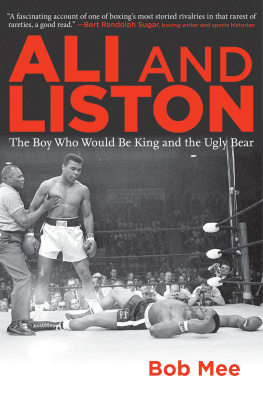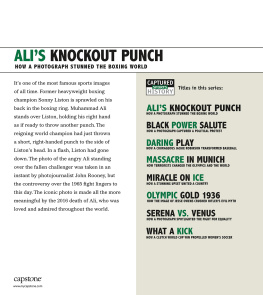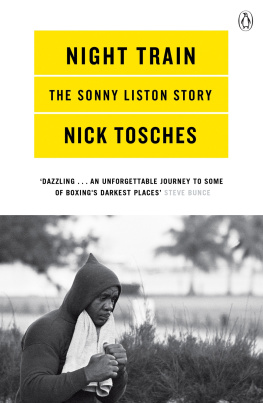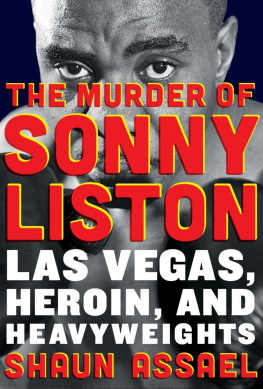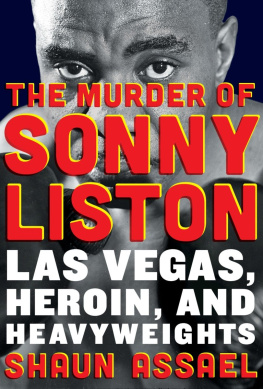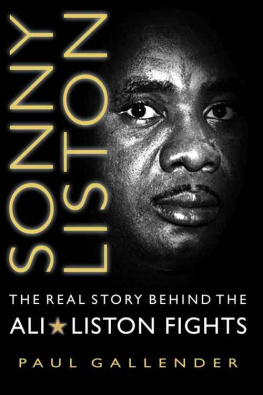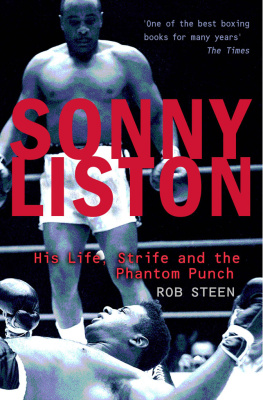ALI AND LISTON
ALI AND LISTON
The Boy Who Would Be King
and the Ugly Bear
BOB MEE
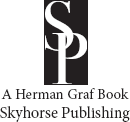
Copyright 2011 by Bob Mee
All Rights Reserved. No part of this book may be reproduced in any manner without the express written consent of the publisher, except in the case of brief excerpts in critical reviews or articles. All inquiries should be addressed to Skyhorse Publishing, 307 West 36th Street, 11th Floor, New York, NY 10018.
Skyhorse Publishing books may be purchased in bulk at special discounts for sales promotion, corporate gifts, fund-raising, or educational purposes. Special editions can also be created to specifications. For details, contact the Special Sales Department, Skyhorse Publishing, 307 West 36th Street, 11th Floor, New York, NY 10018 or info@skyhorsepublishing.com .
Skyhorse and Skyhorse Publishing are registered trademarks of Skyhorse Publishing, Inc., a Delaware corporation.
Visit our website at www.skyhorsepublishing.com .
10 9 8 7 6 5 4 3 2 1
Library of Congress Cataloging-in-Publication Data is available on file. ISBN: 978-1-61608-369-4
Printed in the United States of America.
CONTENTS
INTRODUCTION
I n Louisville, Kentucky, in July 2004, to cover what turned out to be Mike Tyson's unexpected defeat by the London heavyweight Danny Williams, I sought out Muhammad Ali's childhood home. As Sky colleague and friend Dave Culmer and I drew up opposite the white-boarded house, by complete coincidence BBC men Mike Costello and Steve Bunce were there, interviewing Ali's brother, Rahaman. When they had finished, I had a chat with Rahaman, sitting on a step under a tree. In the summer sun, he dropped his voice a little for just the briefest of moments and recalled how he and Ali used to sit there as boys, dreaming their dreams of all they might do with their lives. There was no need to fill in the pause that followed. Finally, he said: Don't feel sorry for Muhammad. Because Muhammad don't feel sorry for himself.
Tyson was to box Williams in the Freedom Hall, where long, long ago Ali had made his professional debut against Tunney Hunsaker, a part-time fighter and full-time policeman from Fayetteville, West Virginia. Tyson had also gone to see Ali's old house. A police officer had given him a lift. In that week, Tyson seemed to know his time in the business that had made and broken him was almost up. He also knew that in years to come nobody would be making small but splendid pilgrimages to the house where he had been raised. Nobody would be opening, as they were shortly to do in Ali's honour in Louisville, a museum in his name.
There aren't any museums in Sonny Liston's name in St Francis County, Arkansas, either.
There are those who have seen a little bit of Liston in Tyson: the darkness, the apparent ability to self-destruct, the tendency to embrace chaos at every turn. There was, however, no similarity in the way they expressed themselves in interview. Tyson laid out either himself or the side of himself he chose to be on that particular day to be picked over by anyone who was paid to be there. To understand how manipulative Tyson was you had to become experienced at listening to him. It is fairly safe to believe that listening to Liston was an altogether different experience. If Sonny gave writers more than a sentence or two, it took on the significance of the Gettysburg Address.
When I began this book, I looked back at my Louisville notes for one of Tyson's confessional monologues in front of writers. His words carried an intimacy that led some to claim he had spoken to them and them alone. Perhaps that is why, in spite of all that he did, Tyson in general received a pretty sympathetic press. Liston got little or no understanding. Neither did he ask for any.
In Louisville, Tyson said:
The pressure of fighting, it drives you crazy. Some guys do crazy things. It's all very well calling a fighter a nut, but you don't know the pressure of getting bashed upside the head in front of, say, 100,000 people Sometimes when you are successful you get a lot of money, but it restricts you from being you. I'm pretty cool now. I'm rounded but if somebody gives me a whole garbage can of money, I might start being a psycho. I have mistreated a lot of people. I was a monster not too long ago
At the end of 2006, I was in Little Rock, Arkansas. Again, on a day when work was slow Dave Culmer and I took a trip out into the cotton fields. We went up the interstate towards Memphis, pulled off at a place called Palestine and turned north into the cotton fields and swamps. There isn't anything or anybody to tell you where Sonny Liston was born and raised. One or two might guess, but that's all it would be. We drove up dirt tracks where Liston might have walked, past creeks where he might have swum. We were in the right area of St Francis County, near Johnson, where the piece of land called the Sand Slough was. Liston was born there in a fragile wood-board shack. His mother, Helen, once said she put cardboard on the walls to keep out the wind. That home, from three-quarters of a century ago, would have been long gone.
As we eased the hire car over the rutted tracks, the satellite navigation system stopped working. Out of the car, with the bare land stretching to the horizon on one side and a swamp full of dead trees on the other, it was eerily quiet. I took a few strands of cotton left behind after the harvest (and have them still in the drawer of the desk at which I write). For a fleeting minute or so, I could feel what it might have been like to grow up here, to know this and only this, to live in a time where the past was remote and confused. And without the past, what could the future have meant? The Listons, Helen and her husband Tobe, who was the son of a slave, bent their backs over these cotton fields for a meagre living until some time in the mid-1940s when Helen walked out for a dream of prosperity and a back that ached less. Sonny went too and, as far as anybody knows, never came back.
Dave and I, enriched by whatever it was that we learned, pulled out along the dirt roads, back to a place the sat-nav recognised, on to tarmac and the twenty-first century, ate at a friendly place called Catfish Island, left it at that.
Liston's resting place is easy to find: it's in Paradise Memorial Gardens, Las Vegas, under the flight path of planes landing at McCarran International Airport. You'll see his metal plaque on the ground near the place where they bury babies and children. The plaque says: Charles Sonny Liston 193270 and below, starkly, A Man.
From the moment I read the newspaper and magazine cuttings handed down to me by the journalist and television commentator, Reg Gutteridge, I wanted to use them to explore the story of Ali's two controversial world heavyweight championship fights with Liston in 1964 and 1965. The first ended with Liston, supposedly one of the toughest men ever to walk this planet, sitting in his corner complaining of a sore shoulder, and the second was a muddled first-round knockout that had people yelling Fix, Fix, Fix! in the arena.
It was a volatile, unpredictable time in a country troubled almost to breaking point. Ali, when he was still Cassius Marcellus Clay Jr, challenged Liston for the title only three months after the assassination of President John F. Kennedy. The man arrested for killing him, Lee Harvey Oswald, had been killed even before extensive interviews could be carried out. Oswald's murderer, Jack Ruby, claimed he acted alone on a furious impulse. Very few believed him.
Next page
